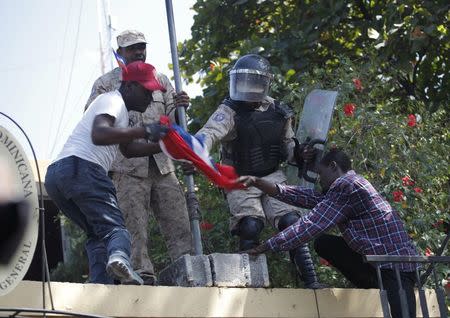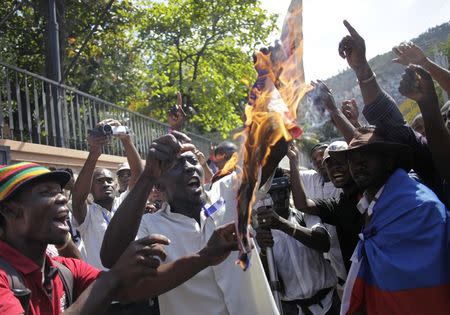Dominican Republic shutters consular offices in Haiti due to attacks
By Manuel Jimenez SANTO DOMINGO (Reuters) - The Dominican Republic announced on Wednesday the temporary closure of its consular missions in neighbouring Haiti due to "recurring attacks" posing a danger to diplomats and staff. The announcement by the Dominican Foreign Ministry followed weeks of heightened tension along the 250-mile (400-km) border between the two countries which share the island of Hispaniola, the most populous in the Caribbean, with a combined 20 million inhabitants. The Dominican foreign ministry said its four consulates in Haiti would remain closed until Haitian President Michel Martelly "guarantees adequate protection." The foreign ministry noted that the Vienna Convention governing diplomatic relations requires governments to provide the necessary protection to ensure the safety of staff. Last week about 10,000 people marched on the Dominican consulate in Haiti's capital to protest over alleged mistreatment of Haitians in the Dominican Republic. The Dominican flag was torn down and burned by the crowd. The foreign ministry noted two other incidents including one in Ouanaminthe, northern Haiti, in December that caused damage to the consulate there, and another in the southern border town of Anse-à-Pitres, in January. Last month the corpse of a Haitian man who shined shoes for a living was found hanging from a tree in a public park in the Dominican Republic’s second-largest city, Santiago, according to the Dominican Today news website. Relations between the two countries have been on edge following a Constitutional Court ruling in the Dominican Republic in 2013 that denies citizenship to children of Haitians born in the country. The tensions are longstanding and stem from the Dominican Republic's occupation by Haiti in the early 19th century. Haitian troops occupied the Dominican Republic from 1822 to 1844. Dominican school textbooks recount atrocities committed by Haitian troops during the occupation. Many poor Haitians continued to work in the Dominican sugar cane fields and in 1937 Dominican dictator Rafael Trujillo sought to drive out the Haitians, resulting in a slaughter estimated at anywhere between 5,000 and 30,000 men, women and children. (This story corrects reporting credit) (Additional reporting by David Adams in Miami; Editing by Andrew Hay)

 Yahoo News
Yahoo News 


